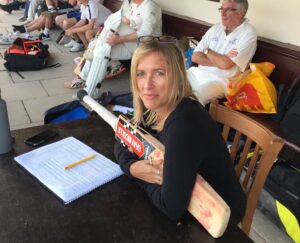“You’re everything that’s wrong with County cricket!”: Meet the woman ‘attacked’ by Kevin Pietersen for refusing to give up on the game
In an exclusive interview for the Sports Gazette, editor Oliver Lawrie speaks to the woman who, despite misogyny, marginalisation, and Kevin Pietersen’s opinions, simply won’t stop championing County cricket.

Looking back now, Annie Chave had no choice but to fall for County cricket.
It was written in – or rather by – the stars. Viv Richards and Joel Garner’s appearances for Somerset in the 1970s saw to it that Chave would be where she is today.
All these years later, she sits opposite me as a cricketing trailblazer – as someone who works to give county cricket a media platform when few others will.
More than that, though, she speaks as someone who is resolved to amplify the voices of those who hold the red-ball game so dear, in the hope they might not be drowned out by the cacophony of commercialised cricket.
Through the effort she puts into her work, Chave hopes to offer a wilting game the chance to blossom once more – just as it did for her all those years ago.

As you will soon find out, though, Chave’s story is about so much more than just cricket.
In a media world that shows such hostility to those who dare challenge the status-quo, and in the face of the overt misogyny women must face up to every day of their lives, Chave’s story goes far beyond just campaigning for the four-day game.
Her story is one of resilience, decency and the strength of character needed to commit oneself to a cause in the knowledge it’s the right thing to do, even if the world around you does nothing but tell you otherwise.
County cricket needs help, so why don’t they listen?
You will have your own opinions on its merits, but the County game has steadily moved towards the fringes of an (over) saturated cricket market, most notably since the turn of the millennium.
Given the importance the England Cricket Board (ECB), and its new chair Richard Thompson (pictured below), purport to place on struggling the domestic red-ball game, you’d think someone with the knowledge, contacts, and passion for the county game like Chave would be in high demand.
And yet, despite her best efforts, not only does she struggle to make headway in helping the game, but she also receives no gratitude whatsoever from the ECB:
“I get no recognition from the ECB, and have actually been a thorn in their side a little bit. I’ve said to the ECB: you could use me, I could really help you [with County Cricket], but then nothing happens. I met [the former CEO of England Cricket] Tom Harrison, but everything was off the record. I haven’t spoken to an ECB person without them making sure everything was off the record.”
This saga begs the question: why do they take the time to listen to Chave off the record if there’s no intention of implementing her advice?
I don’t mean to prejudge the situation at all – but considering the importance the ECB place on communicating any changes with the counties, Chave’s input strikes me as something they really shouldn’t be ignoring.
A female trailblazer in a man’s world
Given the position of county cricket nowadays, these are struggles that anyone in Chave’s position would feel.
This cannot, however, detract from the fact that, due to her gender, having to work harder to get her voice heard is just something she’s had to deal with.
On being a trailblazer in the cricket media, with the kind of genuine modesty many have come to expect from Chave, she was keen to point out that others deserve credit as much as she does.
The likes of Raf Nicholson, Alison Mitchell, and Isa Guha, to name but a few, too, have been and are breaking down barriers for others to follow.
But this modesty can’t detract from the context in which Chave’s promoted cricket – it must be noted that she’s had every success in the face of misogyny and mansplaining.
Chave, for example, recalled the time when she was thrown out of her colts team when they found out she was a girl.
Social media, too, has played its role in discouraging her efforts. She told me of instances where people – including those at the very top of the game – would launch personal attacks on her and her character.
“There was a point a while back where [name removed] said something really horrible, and I remember thinking I just can’t deal with this […]. That was difficult because I liked them but I didn’t need the abuse, and it should be absolutely irrelevant whether I’m a woman or not. Those sort of things are ridiculous in this day and age.”
Pietersen’s Opinion: “you’re everything that’s wrong with County cricket!”
Former England cricketer turned broadcaster Kevin Pietersen, too, took to Twitter to let Chave know what he thought of her opinions.
“Kevin had a spell of talking about how rubbish county cricket was, so obviously being a county cricket fan, and I responded a few times. Very weirdly, having never met me, he told me I was very mediocre and boring, which he felt epitomises County cricket itself.”
Take a look for yourself.
https://twitter.com/kp24/status/1525743935666196482?lang=de
Despite having never met her, Pietersen seemed intent on attacking Chave’s character rather than engaging with substance of the debate:
“It felt very personal, because it was. You don’t tend to attack people like that when you’re as famous as him […]. It was very foolish. He obviously feels very strongly about franchising cricket.”
Now, Pietersen claims that he was simply responding to a similar tweet from Chave – but this goes beyond a game of who said what.
The point is, if we are to reach a point where cricket really is a game for everyone, such an outburst from those who hold real influence, both over the game and its media, is about as damaging as it is unproductive.
If you stick your head above the parapet – even in a small way – and you are personally attacked as a consequence, what incentive is there for the diverse voices cricket so desperately needs, in the media or otherwise, to keep speaking up?
Is cricket worth it?
You won’t be surprised to hear that Chave has already asked herself the dreaded question: is this worth it?
“Sometimes I think, God. This is such hard work. You put yourself out there as a woman, and then you get so many mansplainers and people telling me what I should and shouldn’t do.”
But, notwithstanding everything she has to deal with, Chave just can’t give up on county cricket for one reason: the people.
“I get emails and cards from people saying keep going – what you’re doing is really important to us – and then I think ‘this is why I’m doing it’. Not for the cards, obviously, but because it really does matter to people, and an incredible amount of people actually.”
http://gty.im/1428731199
A cause for celebration
Deciding to love cricket is easy – even if an England fan staring down the barrel of another Ashes whitewash would tell you otherwise.
Deciding to use your passion for cricket to achieve something greater than yourself, however, is anything but.
It is this which struck me most during our conversation. Even if she wouldn’t say it herself, she is a trailblazer in cricket.
Through all manner of discrimination, she’s had the resolve to provide a struggling form of cricket with the voice it so desperately deserves, and, given recent events, so desperately needs.
Despite the obstacles she has faced throughout her life, giving up on County cricket just wasn’t an option.
And, for every day this remains the case, the world of county cricket will be in a better place than it was the day before.
In a changing world, Chave’s story serves as a timely – if all too necessary – reminder of why the drive for diversity and inclusion is so essential to the future of cricket.
But, for now, we’ll do well to celebrate the likes of Annie Chave.
It is said that all the darkness in the world can’t extinguish the light of a single flame.
And, no matter how gloomy the outlook may have seemed for the county game – or for women in cricket for that matter – Chave has been a guiding light, offering a lost game direction in the darkest of times.
Now, we must make sure that others can follow her lead – that future female voices won’t just burn brightly like Chave, but will be allowed to blaze in all their glory for generations to come.
Because then, and only then, might the shadows of discrimination – which have loomed over the game for so long – stand a chance of being torched out of existence, once and for all.
Now that’s something we all can agree on, right?
–
Enjoyed this article? Why not show your support by following @oliverlawrie and sharing the article below?